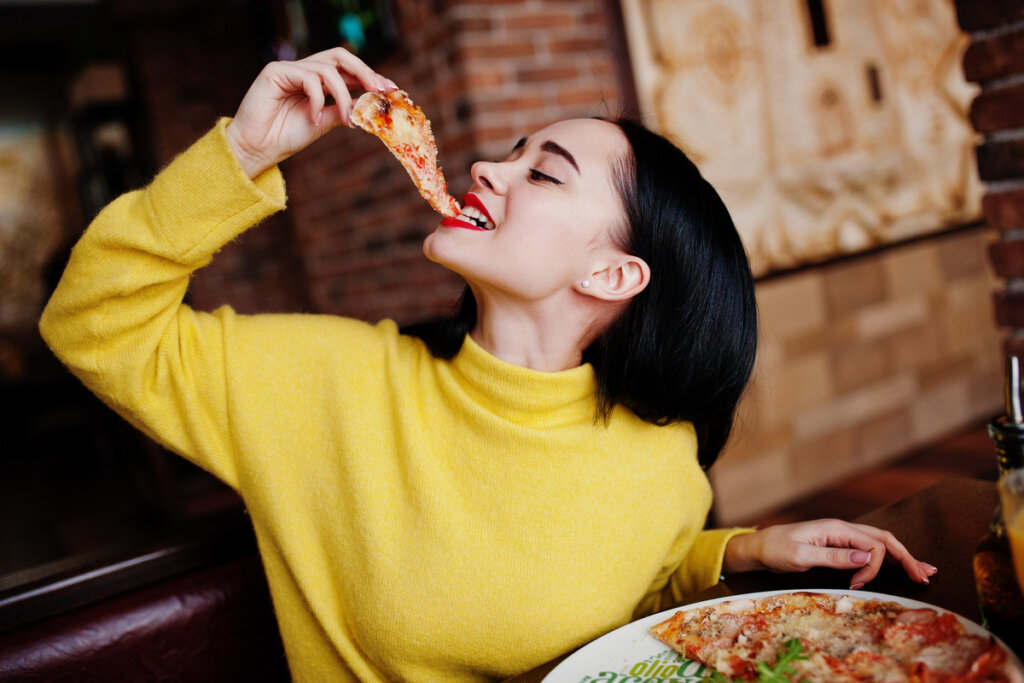Don't Diet, Use the 80/20 Rule


Written and verified by the psychologist Sharon Laura Capeluto
The 80/20 rule diet isn’t a miracle diet. In fact, it’s not even a diet. It’s a strategy that allows you to acquire healthy eating habits without depriving yourself of anything. Yes, you can have a hamburger and fries. You can also drink beer and don’t have to leave out bread. You don’t even need to forget about desserts. With the 80/20 rule, you can follow a healthy diet without denying yourself any kind of food.
You might think this sounds misleading. After all, when it comes to eating, we seem to see things in absolute terms. For example, “Pastries are bad and vegetables are good”. Therefore, a proposal that offers the possibility of being healthy by eating everything sounds so far-fetched as to almost be impossible. However, if you stop for a moment to reflect, you’ll be able to understand the background that supports the effectiveness of the 80/20 rule. In fact, by using it, you’ll achieve balance, which is all you need.
If you’ve clicked on this article, chances are you’ve already tried (and abandoned) a strict diet. You probably gave it up because dissatisfaction, guilt, and frustration took center stage. That’s because you believed that to lose weight you must go hungry and say goodbye forever to the foods you like the most. Little wonder it was torture.

Why diets don’t work
Miracle diets are eye-catching. Many of them announce that you’ll reach your goal weight quickly and practically without any effort. Unsurprisingly, people find this really tempting.
While many people around the world are constantly claiming that they’ll ‘go on a diet’ next Monday, in reality, it’s hardly surprising that diets don’t really work. While eating an extremely low-calorie diet most of the time does reduce weight, it’s generally water or muscle that’s lost and not fat.
Furthermore, a restriction in intake isn’t usually enjoyable, thus, can’t be maintained over time. Consequently, it doesn’t take long for the famous ‘rebound effect’ to appear, accompanied by certain other psychological and physiological consequences.
The 80/20 diet rule
The 80/20 rule is based on Pareto’s law. It’s a rule in the world of economics that says that 80 percent of results are achieved by 20 percent effort. This economic concept has now been extrapolated to the area of food.
The proposal is extremely interesting. You eat healthily 80 percent of the time and reserve the remaining 20 percent for foods that you like, but aren’t so healthy. Therefore, you can be healthy and even lose weight (if you want and need to) by eating ‘right’ most of the time and ‘wrong’ the rest of the time. However, we must stress that thinness isn’t synonymous with health nor does fatness equate to illness.
Taking the percentages to more specific numbers, we can say that if you eat four meals a day (breakfast, lunch, snack, and dinner), you should eat 23 healthy meals a week and 5 unhealthy ones. 80 percent ‘good’ and 20 percent ‘bad’ are elements that feed each other. In effect, they’re not opposite but complementary.
“After 12 weeks of following the 80/ 20 diet and getting regular exercise, you’ll be leaner, your body will be more toned and you’ll feel fantastic and energised. You’ll also have discovered a program that is so easy to follow, you will be able to continue this liefestyle for the rest of your life”
-Teresa Cutter-
This method isn’t intended to represent a rigid or universal plan, but rather to be a guide that serves as an orientation. It’s essential to incorporate solid knowledge about food to relate to it in a healthier way and thus make a change of habits effective. Just as Francis Bacon claimed, knowledge is power.
Diets and guilt
Guilt is the basis of restrictive diets and the foundation of relapse. It’s a continuous cycle. You radically change your diet. You avoid flours, sugars, and fats for the first two days and, on the third day, you end up breaking your self-imposed rule with no restraint. Then, torturing guilt appears.
You decide to abandon the diet and resume your usual diet. After a few days or weeks, you try again. Consequently, the cycle repeats itself, causing you feelings of dissatisfaction and dependency.
However, with the 80/20 method, your feelings of guilt will lose their strength and may even disappear. That’s because you’re allowed to eat foods that aren’t considered healthy. Therefore, it’s difficult to maintain your feelings of guilt. In fact, not prohibiting food helps you to stop worrying about what you eat, without it meaning neglecting yourself.
A family lunch, a get-together with friends, or a birthday dinner where you eat a starter, main course, and dessert are events that you no longer perceive as a threat when you apply the 80/20 rule to your life. Indeed, they become what they should be: spaces for enjoyment.

Recommendations for applying the 80/20 rule
Here are the main recommendations for applying the 80/20 method:
- Make a consultation with a health professional who specializes in nutrition. They can devise a personalized plan according to your weight, lifestyle, and goals.
- Try to incorporate, most of the time, foods of high nutritional quality that fill you up. A balanced plate is half made up of vegetables, a quarter of proteins such as chicken, egg, or vegetable proteins, and a quarter of carbohydrates such as rice or potatoes.
- Measure out the number of servings. Registering your level of satiation will help you to differentiate physiological hunger from emotional hunger which will help you a great deal.
- Reserve the ‘unhealthy’ 20 percent for social events, weekends, or special holidays. That’s because it’s usually far more complex to maintain a moderate diet in circumstances outside of your normal routine.
- Incorporate conscious eating strategies so you can adopt an active position regarding your choice and consumption of meals.
- Don’t skip meals. This will help you avoid snacking.
The 80/20 rule doesn’t boast of immediate success, but it does produce lasting results. You probably won’t notice any physical effects after one or two weeks, since you’re only just starting to incorporate healthy habits to last throughout your life. However, eventually, in addition to your physical health, your emotional health will be strengthened.
All cited sources were thoroughly reviewed by our team to ensure their quality, reliability, currency, and validity. The bibliography of this article was considered reliable and of academic or scientific accuracy.
- Basulto, J., Mateo, M., (2016) No más dieta: Por qué las dietas milagrosas no funcionan o cómo aprender a comer saludablemente. Penguin Random House Grupo Editorial España.
- Moscato, L., (2021) Qué es el método 80/20, para bajar de peso sin privarte de nada. Diario Clarín.
This text is provided for informational purposes only and does not replace consultation with a professional. If in doubt, consult your specialist.








